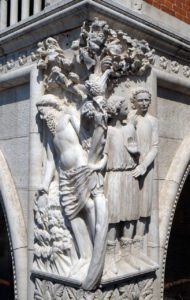The Deadly Danger of Misinterpreting Scripture
 Noah’s only recorded words in the Bible, found in Genesis 9, were an oracle that contained both cursing and blessing and came true. In the ancient world, a curse was only as powerful as the one who spoke it. Unless the Lord brought about what was spoken, what was spoken was meaningless. So, whom does Noah curse? Canaan! “Cursed be Canaan; a servant of servants shall he be to his brothers.”
Noah’s only recorded words in the Bible, found in Genesis 9, were an oracle that contained both cursing and blessing and came true. In the ancient world, a curse was only as powerful as the one who spoke it. Unless the Lord brought about what was spoken, what was spoken was meaningless. So, whom does Noah curse? Canaan! “Cursed be Canaan; a servant of servants shall he be to his brothers.”
Ham’s sons were Cush, Egypt, Put, and Canaan. Canaan alone was cursed to become, he and his descendants, a servant of servants, or a slave of slaves. Remember, Moses was writing Genesis to the wilderness wanderers, the nation of Israel that had come out of slavery in Egypt and were headed to the promised land that is populated by…Canaan! You could argue that Moses here tells them why the Canaanites are so vile and wicked, pagans in every sense of that word. If you want to see a description of their sinful behavior, which included every form of sexual immorality, you can find it in Leviticus. The Canaanites even offered their children as sacrifices to Molech, a pagan god.
Why did Noah curse Canaan when Ham was the one who sinned against him? We do not know for sure, but some scholars suggest it was because Noah saw these same traits in Canaan that were in his father. And though the curse is for Canaan, Ham would suffer greatly with his own shame and because of the wickedness of his youngest son and his descendants.
But there is a horrific problem caused by ignorance of this text.
Read this carefully: Good biblical interpretation brings blessings and good fruit; bad biblical interpretation brings great destruction and destroys lives. What is the rotten biblical interpretation of this passage that has brought destruction? Noah did not curse Ham. He cursed Canaan. God makes that clear in the text by telling us twice that Canaan is the son of Ham and that it is Canaan who was cursed. But misinterpretation of this text in the church in America in its infancy led to the justification of slavery. The ESV Study Bible commentary says, “This passage was wrongly appealed to in past centuries to justify the enslavement of African people, resulting in grievous abuse, injustice, and inhumanity to people created in the image of God.” If you look at a map of where Ham’s sons ended up living, you see that his sons named Cush, Egypt, and possibly Put did settle in Africa. Canaan, however, settled in the fertile crescent, the promised land, Israel, and would become a continual thorn in the people God sent there to conquer and to prosper. Canaan was cursed, not the three sons who ended up in Africa.
Again, misuse of Scripture can be deadly. Jen Wilkins says, “We can’t even begin to calculate the horrors that resulted from this misreading of Scripture. It goes back to a simple Bible literacy principle: ‘If you can rely on people not knowing what the text says, you can use the text to accomplish whatever evil you want.’”
It reminded me of a pastors’ conference I led years ago in Kenya, and one of the pastors stood in front of everyone to ask me a question about a bishop over his region who had multiple wives and had (I put this delicately) ‘taken liberties with’ young teenage girls in some of the churches he led. The pastor said to me, “The bishop has told us when we question him that we are wrong to do so, because the Bible says, ‘Touch not my anointed ones, do my prophets no harm!’” I was stunned by this and told him that this man was neither anointed nor a prophet if he was engaging in such blatant abuse of God’s people, and that they had every right to touch him. Repeatedly. Ok, I didn’t suggest they hurt him physically. Just that they remove him from office immediately so that he could no longer hurt others, himself, and do further damage to the Gospel of Jesus Christ.
Reading the Bible is very important. Interpreting it correctly is vital.
